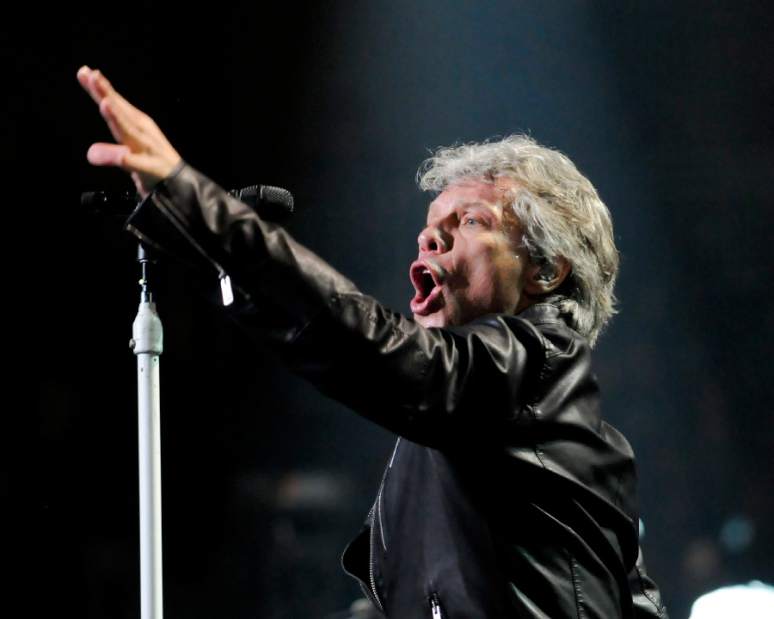Bon Jovi back on the road for first time since split with guitarist Richie Sambora
For 30 years, Bon Jovi had been as consistent as any major rock band. If you discount the dismissal of bassist Alec John Such in 1994, the remaining quartet — Richie Sambora, David Bryan, Tico Torres and Jon Bon Jovi himself — was as dependable as summer arriving at the Jersey Shore.
Then Sambora blew things up in 2013 by leaving the band mid-tour, to spend more time with his daughter. Bon Jovi's latest album, “This House is Not for Sale,” is a restatement of purpose.
“It's the first record without Richie,” keyboardist Bryan said during a recent teleconference, “and we haven't been in communication with him since the last tour — well, since 15 shows into the last tour ... and he's decided to not be in it anymore and we decided to keep going. And we're going to keep going. And I think this record was just everybody stepping up and saying, ‘This house is not for sale. This is what we want to do.' … Is it the way we wanted it? No. But it's not our decision.”
In an interview with People magazine last year, Jon Bon Jovi said, “There was no fight or money issues, like the reports say. Nobody expected Richie to quit in the middle of the night for no reason. He wasn't fired; he just didn't come to work.”
He told the Today show early this month, ““What was then was then and what is now is now. You've never heard me say a bad word about the guy. I love him to death. But there was no way I was going to be hindered by his departure.”
Phil X, who has performed with Alice Cooper, Rob Zombie, Kelly Clarkson and Avril Lavigne, is Bon Jovi's new guitarist after filling in for Sambora after he left the band. Hugh McDonald, who has played bass for the group since 1994, also is officially a fulltime member.
When “This House is Not for Sale” was released in November 2016, it reached No. 1 on the Billboard album charts. Success is therapeutic, but also is being a full band again, according to drummer Torres. It has helped mitigate any residual after-effects of Sambora's departure.
“At the end of the day, it's a process, and to be able to have all of the guys in the studio and in the sense of — yeah, it's important that we are a band working together,” Torres says. “A lot of this record was done in the studio and by the old way, we used to banter back and forth and try parts and then just record it. And I think the success of the album is because it does have that band element. It's not just music put together and then filled in. So, everybody had a good part in this.”
“The therapy is walking on stage, playing all of our songs, and walking out,” Bryan said. “That's probably my therapy. That's a good time. I think bad times, I sit down and I play — there's definitely certain songs that touch in certain ways. I go back to ‘Moonlight Sonata' by Beethoven; that usually takes care of everything.”
There's another reason why the core three — Bon Jovi, Bryan and Torres — had no doubts about the band's survival. Being from New Jersey gives them a mental toughness, a metaphorical chip on the shoulder, that serves them well.
“You can never get away from where you grew up and where your roots are,” Torres said. “So, that's who we are, and it's always about we're a bunch of guys from Jersey that made it. We've worked (hard) and it took a lot of hard work to get lucky and we got lucky through a load of hard work and we're proud of it and those (things) are still reflected in our songs and our attitude.”
WHAT THEY'RE THINKING
On the long-term prospects of the band …
David Bryan: We've been here since 1983 as a band. I've been with Jon since 1978, and our roots are deep and we keep digging in and we keep growing at the same time. So, for us, it's a statement that we're not going anywhere and it's not for sale. We're just — it's our house and we're proud of it and we're going to keep bringing it around the world until they nail the coffin shut.
On the pressure to measure up to past tours and albums …
Tico Torres: I think we always try to be better than we were in any situation; try to do the best music you can, try to do the best tour that you can. Sometimes you can't really chase that, but you have to be happy with what you're feeling. I think if you're true and you're feeling good about it, it'll translate as a good show. It doesn't matter if you have one spotlight. If the band's not on, it's not going to convey anything. So, the bottom line is we try to play (hard) and have some fun on stage. And so, really it's a big party. We want our audience as part of our band and we want them to sing and revel as much as we do. So, we count a lot on that as well to turn each other on, but that's the bottom line. I mean, it's really just having fun.
On the bands multi-generational appeal …
Bryan: We started out a long time ago and we've managed to just keep writing current songs and have No. 1 current records. And we keep bringing along those fans and then those fans are growing up and having kids, ... so for us, it is multi-generational and that's a great compliment that you can still have a little kid singing a new song and still singing, “Livin' On A Prayer.” So, it's a nice compliment to the power of a band and the power of a good song.
Torres: Music is always ageless and timeless, I think. ... I remember when the Beatles came out and I think their music still is strong, if not stronger than it was then. So, I guess you grow up with what you grow up with, and it's kind of nice to be part of that with young people.
On songs that have grown to have deeper meaning …
Torres: Two of my mine remain “Wanted Dead or Alive” and “Livin' On A Prayer,” obviously. That has transcended time and it's hit people in a certain way. It's not only thematic, but it seems to — if you had to sum up Bon Jovi's legacy, that song would be probably at the top of the list, and I think because of the optimism.
Bryan: It's amazing those songs, and then “It's My Life,” and there's a lot of great songs there. So, it's kind of hard to say which is your favorite, but those are classic ones that keep going forward. We're blessed by that. We touch a nerve within our audience, and it definitely transcends time.
Rege Behe is a Tribune-Review contributing writer.







